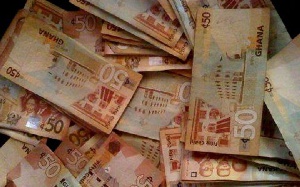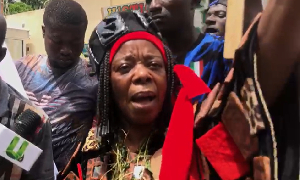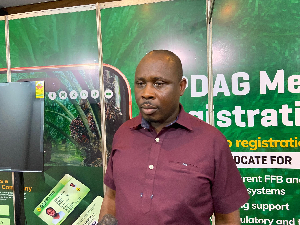Mone...in the West, one maybe hears the word money four or five times a day. On the streets of Ghana, it can be heard up to 100 times a day.
Over time, a separation in peoples' minds has been created between what money actually is, what it means and what it can achieve; and their perceptions of all three.
This disconnect is restricting Ghana and individual Ghanaians from feeling a genuine day-to-day improvement in their lives because their attitude to money is consequently incorrect. Ghana is obsessed with money, or more precisely what it thinks money is.
True, not worrying about money is the luxury of those who have it. But that is too simple to explain something far more complex, deep-seated and, therefore, important.
The common logic follows that people who have money have it because they are obsessed with accumulating and then keeping it. But actually once money has been acquired people almost look to keep the term money out of their lives.
For people, who have money, they spend it to create barriers between them and the unwashed masses to reinforce what they view as their own inherent superiority. They try to keep actual figures out of it because for them their superiority exists alongside not because of their money.
At its heart, this issue goes back to something which we believe to be intrinsic to human nature-wanting what we can't have.
But then money is something that we can have. Nearly everyone does. It's about having ENOUGH money. But then the concept of enough-satisfaction and sufficiency- breaks down in people's minds.
Of course, this is where the role of consumerism must be examined.
Capitalism has survived and thrived by the constant creation of new markets either by expanding the boundaries of the world-economy or creating new markets internally normally through technological change.
This expansion is based on the conversion of needing necessities and wanting luxuries into needing both necessities and luxuries, and creating new luxuries and necessities. Accumulation becomes an endless process in both consumable and non-consumable goods and services.
The concept of having 'enough to live comfortably' is undermined by the constant redefining of what enough is. In a way this is a natural part of the human psyche. But profit hungry capitalism exploits that original human weakness clearly for their own benefit and supposedly for the benefit of the consumer, as they perceive it.
This ties into the obsession with 'economic growth'. The economy must keep on expanding, the drive towards more, more and more sucking in increasing resources for decreasing levels of satisfaction. This has deepened a worrying obsession with intangible figures that seemingly justify brutal inequality-creating economic policies.
At the core of economic theory is the concept of scarcity. Human ability to produce is finite because the resources it has to do so are finite. However human desires are generally considered to be infinite. Humanity has extended this to desiring infinite economic growth which effectively means the desire for infinite money and stuff.
The world has become addicted to 'enough' never being enough both on the individual level, ie the 'consumer', and as a whole.
At the end of the day, though, money is a means to an end. Money at its heart is the process of barter simplified by pegging all prices to a common unit of exchange. Of course, money is the true measure and means of purchasing power. It follows that the more money you have the more you can purchase.
Thus it is true that money is a means to many ends – though,perhaps, not happiness.
What is interesting about the relationship between the concept of 'money' and the attitudes of those who don't "have it" is that money starts to become a byword for other parts of their lives where they lack the means to achieve the end they desire. This extends to the point where they lose sight of reality and view money as THE end of everything.
The main reason why they do this is because it is easy. Lack of money is the greatest barrier to their lives being happy and satisfying, or so they believe. It is easy to use money as the excuse as to why they have not achieved something. Thus money becomes their go to answer, solution and inevitably problem.
A situation where the problem is the lack of money, the reason is a lack of money and the end result is a lack of money is not a positive one.
It is a constant complaint of many financial institutions, especially venture capital firms, that people come to them with 'the next big thing' and demand money. On the face of it, this is good because they want to give money to 'the next big thing'. However, the issue is that they are demanding money when they do not truly need it, or at least not so nearly as much as they are
More often than not, 'the next big thing' doesn't need money. Instead it needs firstly to be a definite 'thing', then it needs to have a clear purpose or marketable, i.e. profitable, end and then it needs a sense of progression away from being 'the next big thing' to becoming 'the big thing. Effectively it needs aims and then a strategy to achieve them.
Finally and crucially it needs energy. It needs the energy of its creators to drive it onto new heights. Energy and inventiveness are a powerful combination, a more powerful one than money. Money is just the oil to make the system run smoother.
Too much and the surplus of money destroys the system as it stops the entrepreneurs from having suffice energy to make it successful in the long term. Without that energy, that drive to create the system out of the idea in the first place, it is simply money down the drain.
Effectively money cannot overcome an inherent laziness in human beings. However, where no hope of money exists it is amazing where human ingenuity and energy can take people. This is observable in countless war economies as they have to tighten their belts. Some of the greatest advancements in human history have come on the back of these times. The Biafra episode demonstrates this clearly.
Worsening this situation is a sense of entitlement people can have towards receiving money. It means that when they get it they do not treat it correctly, losing it in the process most likely. They do no put it towards effective uses and because it may be a sum of money larger than they have ever had before they lose their sense of proportion and start to disassociate money from its actual value, allowing their brains to give it an imagined value.
The end result is that people never escape the trap of poverty and genuinely not having 'enough' because their minds become clouded by their misunderstanding of what money is and can achieve. This distracts from the true source of their problems which is often a lack of energy to achieve what they want.
It is a cycle of poverty. But it is a cycle that is caused by the downward spiralling flawed thought process in people's minds built on their incorrect understanding of money.
Again, it means that when money does arrive from some external source, as they so desired, then it has no actual long term impact. This is because it isn't earned through expending energy, time, blood, sweat and tears.
Something that is given cannot be truly appreciated if the relationship between giver and receiver is not in some way equal. When the money does come along because it is not valued properly it simply disappears, failing to achieve its intended purpose.
This is partly why aid has not worked and will never work. The mind-set of the receivers prevents it from every working to the extent it should do if, as well as the equally distorted incentives of the givers. Money is used where energy can and should be.
For this reason Africa's economic development and hopefully transformation must not be based on the grounds of money. Money has been tried and it failed. The reason it failed is because it hit the ground and then drained away into it immediately.
The African mind-set hasn't changed because it didn't need to be changed as the money has kept on flowing. Thus repeated attempts to do the same thing but with different delivery methods, vehicles and specific targets have failed and will fail again and again.
Instead fundamental change in the African mind-set is required. A farmer does not water his crop before he has carefully selected his soil, nurtured it perhaps through the use of fertilisers and compost, chosen his seeds based on meticulous assessment of the local environment and the pros and cons of each choice, prepared the ground, and gone out and planted his seeds. Only then does he water his crop.
To extend this to the modern world say a farmer needs a loan to buy seeds to plant. He should hopefully be able to pay the loan and interest on it back when he harvests his crop and sells it. But if he has not exerted the required mental and physical energy he will be unsuccessful in his endeavours.
If he has done it then his chance of success is far greater and thus the risk of loaning money to him from the bank's perspective is far lower so it is both more likely to give him money and at a lower interest rate. Without the energy the farmer would get nowhere and would go hungry for another year.
To extend this to modern Africa in general, it needs to be thought out what is the part of the African identity and population will be the best foundation on which to launch an economic transformation. It is crucial that it is about identifying and exploiting something that is already endogenous to Africa rather than feeling the need to import in a part of a foreign culture.
The idea of fertiliser refers to education and the creation of a higher skilled workforce with a suitably diversified range of complementary skills.
The choice of seed refers to the best vehicle for achieving economic transformation.
I believe that this vehicle should be the development of high growth potential SMEs. The choice of seed needs to be based on the unique socioeconomic and cultural climate of individual areas and a proper cost-benefit analysis of all options needs to be undertaken.
The preparation of the ground is creation of the correct business environment. It must rest on the principles of a formalised economy and balance the need to be pro-business with the need to combat externalities and channel economic activity to benefit the majority not the minority.
Then there is the planting of the seeds themselves this must be the work of self-incentivised and self-inspired entrepreneurs who can still be helped and given expertise by external sources. Only then can one consider the injection of finance, the 'watering', and even then it may emerge that it is unnecessary which avoids the needs for debt accumulation which may prohibit future growth.
One could extend the analogy one step further and talk about the 'greenhouse' in which the farmer operates which refers to the structure but in place at a continental or at least national level to help the farmer regulate his interaction with the outside world and to minimise external risks beyond the control of the individual. This is where the role of national government comes into play as the creator of the structural framework their countries' international economic activity and interaction is based on.
Indeed, one might argue that a 'greenhouse' is essential, for instance to prevent a foreign-organised flood, i.e. dumping, to destroy the crop or make it worthless. Furthermore all nations which have developed have done so inside their own 'greenhouse' which allowed them to selectively pick the most beneficial parts of the overall global economic situation and mitigate against the worst.
What must be clear is that mental legwork is the key to everything. The use of 'money' as an excuse is pathetic and self-defeating, if it is used to disguise a lack of energy and desire to engage with the fundamental problems on a near-ideological level.
This piece highlights the need to reassess attitudes to money in Africa. But such the revaluation of attitudes towards a concept and reconnection with the true meaning of that concept is needed elsewhere to. Specifically it is needed in those other metaphysical-from the perspective of the individual they can't see it but can't prove that it doesn't exist therefore it must- concepts which are used as excuses.
Government, corruption, foreign companies, management and the West are all examples of where true meaning and understanding are lost and thus these concepts come to be used as vague excuses and to demonstrate wider problems, while hiding the main problem which is lack of energy.
To start with problems need to be reimagined as opportunities to improve the current situation. This requires mental engagement. Mental engagement on these subjects prevents people from using them as easy bywords for 'a big problem little old me can't do anything about' when they can.
The reality that some people need to be incentivised by money to have energy is disgusting. The truth is that people have money because they have energy.
This piece hopefully leads you to the conclusion that Africa needs to think before it acts. For too long Africa has jumped at the next great solution to all its problems without thinking about it. Structural Adjustment Programmes, cash crops, foreign aid, the West, and now China. All sources of money that has not been earned and therefore not understood and wasted.
The lack of energy in Africa to think about Africa for Africa's benefit has allowed the rest of the world get its way in Africa and get what it wants from Africa. Africa needs to think its way out of its problems first then it can start to implement that into real world change, where inevitably money can, will do and should play a role.
The rest of the world isn't going to start thinking about Africa without thinking abouttheir own self-interest first - only Africa can and should do that.
The first step on this path is for the true meaning, uses and power of money to be understood.
Opinions of Thursday, 8 June 2017
Columnist: Alex Mash















